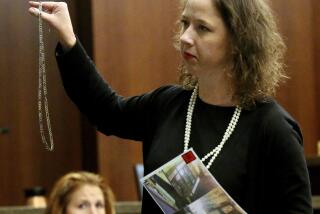Prosecutors Dealt Blow in Murder Trial
- Share via
A Los Angeles judge Monday dealt a serious blow to the district attorney’s case against the notorious Bryant Organization, ruling that prosecutors may not pursue drug conspiracy charges against seven people in connection with their trial for a quadruple murder.
In an effort to speed up the complicated case, which has taken four years to come to trial, Superior Court Judge J.D. Smith ruled that prosecutors must limit their case to the crime at hand: the 1988 slayings of a 2-year-old girl, her mother and two others outside a Lake View Terrace house used to count drug receipts.
But Deputy Dist. Atty. Jan Maurizi said it is essential to her case that she be allowed to explore in court the history of the Bryant Organization, which Los Angeles police say has controlled the distribution of cocaine in the northeast San Fernando Valley since the early 1980s.
“It’s the heart and soul of this case,” Maurizi said. “This is not a simple quadruple homicide, if there is such a thing. They kill people who get in their way. I think the jury has a right to know that. We are not looking at an isolated incident of murders. We are looking at an organization that kills as a part of doing business.”
Smith stopped short of dismissing the drug conspiracy charges, telling prosecutors that they could pursue them after the murder trial. But, he said, to include them in the current case would confuse jurors and make the trial longer and more complicated.
“We’re not going to rest an entire world on this case,” Smith said, adding later: “I just think this case is one of those cases that has grown and it isn’t going to grow any further.”
Maurizi said the Los Angeles County district attorney’s office will decide by the end of the week whether to appeal Smith’s ruling to the state Court of Appeal. The case would be delayed until the appeals court ruled.
The case stems from the Aug. 28, 1988, shooting deaths of Andre Louis Armstrong, 31, James Brown, 43, Loretha English, 23, and her 2-year-old daughter, Chemise. Investigators said the killings occurred at a time when the Bryant group was fending off competition and demands for money from Armstrong, a former associate who had recently been released from prison.
According to authorities, Armstrong was set up to be killed when he was lured to a meeting at the organization’s “cash house” on Wheeler Avenue. Armstrong and Brown were shot to death as they entered the house. A gunman then ran out to their car and shot English and her daughter. The child was killed by a point-blank shot to the back of the head.
Four of the men were to stand trial Monday. Facing murder charges that could bring the death penalty are Stanley Bryant, 34, Jon Settle, 31, Donald Smith, 33, and LeRoy Wheeler, 23. Five others are expected to stand trial later this month. Three face multiple counts of murder. Drug conspiracy charges against the other two also were suspended.
Without the drug conspiracy charges, which alleged that the accused were part of a sophisticated cocaine distribution network, Maurizi will be restricted in the amount and type of evidence she can introduce. Conspiracy charges require enormous amounts of documentary evidence that may have only a peripheral connection to the crime.
Monday’s ruling could make it easier for defense attorneys to challenge evidence during the trial, which is expected to last from one to three years.
“She’s trying to bring in evidence from 1982,” said William L. McKinney, who represents Wheeler. “At that time my client was 12 years old. I think that stuff is irrelevant. . . . Four homicides are more then enough to litigate.”
More to Read
Sign up for Essential California
The most important California stories and recommendations in your inbox every morning.
You may occasionally receive promotional content from the Los Angeles Times.













